Ministers will change the law to ensure that the impact of “militant” union action is less damaging in future, Transport Secretary Grant Shapps said as the biggest rail walk-out in three decades began.
Mr Shapps told Sky News’ Kay Burley that nothing could be done to “change the reality” of the strikes that are taking place on Tuesday, Thursday and Saturday this week.
But he added: “For future strikes… we are going to ensure that the law is firmly on the passengers’ side, on the consumers’ side.”
Government accused of ‘actively preventing’ deal with redundancies notice – live updates
The government plans to do that by changing the rules to allow workers from elsewhere in an organisation, or who are employed by agencies, to fill in for striking workers, and for rules ensuring “minimum service levels” even during a walk-out.
Mr Shapps said current working practices had been allowed to persist on the railways “because we’ve got quite militant unions who we’re having to work with – calling strikes on an unnecessary basis”.
However some of his plans have already been rejected by the recrutiment industry as welll as unions.
The Recruitment and Employment Confederation issued a joint statement with the TUC on Monday calling for the “unworkable” plan to hire agency workers to fill in for strikers to be abandoned.
Read more:
Boris Johnson to condemn unions and call for ‘sensible compromise’
As Tuesday’s strike got underway, the Transport Secretary continued to resist calls to get involved personally with negotiations in the dispute over pay, jobs and conditions.
He said that if he thought that there were a “one in a million” chance that his attending the talks then he would be there but that it was a matter for the employer and the unions to resolve – while admitting that the government was ultimately the “paymaster” setting the funding remit.
RMT general secretary Mick Lynch rejected a claim by Mr Shapps that he had said he would never negotiate with a Tory.
Mr Lynch told Sky News that had been “made up by a Tory press office”.
He added that without a change of direction from the government and employers, more strike action was “inevitable”, and called for coordinated action across trade unions to try to “rebalance the inequalities in our society”.
Mr Lynch said: “My message to the travelling public is that we’re very sorry for the disruption that’s been caused.
“We don’t want to do that. We want to get a settlement to this dispute.”
Around 40,000 members of the Rail, Maritime and Transport (RMT) union at Network Rail and 13 train operators have walked out.
Mr Shapps claimed that by taking strike action, the union was “hurting precisely the people they claim to be protecting”.
“White collar workers, who can simply stay at home, use their computers, log in by Zoom or Teams, will carry on as before,” he said.
“The people that are hurting are people who physically need to turn out for work maybe on lower pay, perhaps the cleaners in hospitals and the rest, and it’s very damaging of thes unions, I absolutely deplore what they’re doing today.”
Pat McFadden, Labour’s shadow Chief Secretary to the Treasury, rejected the call by the RMT for coordinated industrial action and said of the current rail strike: “We very much regret that it’s come to this.”
Mr McFadden said it was an “enormous inconvenience to the public” with “perhaps the bigger threat of ongoing industrial disputes through the summer”.
He told Sky News: “No one wants to see this. We want to see this brought to an end as quickly as possible with a deal that allows the railways to work and the travelling public to get to work.
“We understand why people are pressing for pay rises but it’s far better for these things to be resolved in a proper way, in a negotiation.”
Some Labour MPs have joined striking workers on picket lines though the party’s leadership has banned front benchers from doing so.

